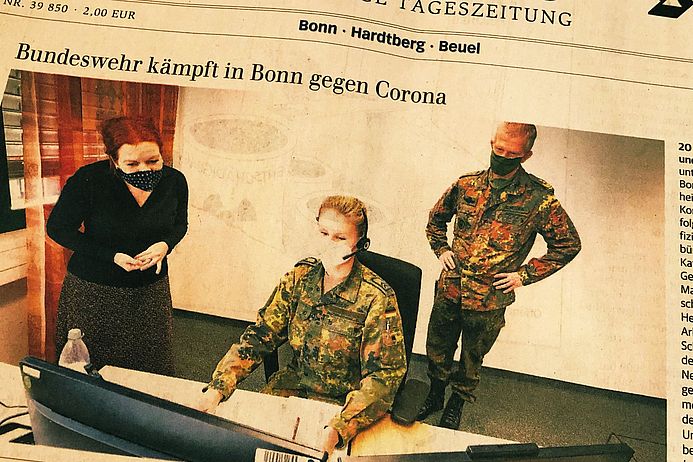The whole misfortune of people is due to the fact that they are not able to stay quietly in one room.
Blaise Pascale
With the second "lockdown light" in Germany in November 2020, which is not as „light“ as the fierce reactions show, "non-pharmacological" strategies for coping with and ending the pandemic are again at the centre of the debate. For despite the latest news, the silver bullet of the vaccination has not yet been released, and the question of who will get it first and when we will finally return to pre-corona normality will accompany us for quite some time.
The model of "global health security" with its war rhetoric (now against the enemy Coronavirus), with ressource mobilisation on national and international level never seen before and the appeal for global solidarity, in which German politicians* such as Angela Merkel, Jens Spahn of the German Government and Ursula von der Leyen as EU Commission President are particularly involved, continues to dominate politics. But if one hears statements from politicians, epidemiologists and health authorities, the reasons for the second wave are quite simple: just like the French mathematician and philosopher Blaise Pascale almost 400 years ago, it is the restless people themselves who are responsible for the disaster, who simply do not want to sit still for even a few months and limit their infectious social contacts. Or cannot do so.
This points to a clear deficit in strategies and debates: People are talked about, but not with them. There is no lack of appeals for responsibility and calls for cohesion, but there is a lack of concrete plans and practices as to how the "unreasonable demands", of which the German Chancellor is again speaking, can be realised and made bearable. How measures could not only be decided, communicated and enforced "top-down", but actually be developed "bottom-up" together. The quasi-military concepts of case finding, tracking, isolation, surveillance and containment, on which the conventional public health model is now again relying, although it seemed to have been overcome in the course of the AIDS crisis, are not suitable for this. The fact that the German army is now being deployed to support the tracking and tracing of infections is ultimately only logical if one is waging a "war".
But shouldn't a real effort by society as a whole look different? Shouldn't schools and day-care centres be able to develop their own strategies to minimise the risk of infection for specific rooms and working methods, instead of waiting for general instructions from the education authorities, which then prove to be of little use in practice? Couldn't the recent proposal by the doctors' union Marburger Bund for using empty hotel rooms for quarantine to prevent the spread of infections within families, shared flats and communal accommodation have long since been strengthened across the board and with clear financial commitments, instead of being implemented only selectively in individual communities in the event of outbreaks of infection in refugee homes or for emergency accommodation for the homeless? Instead, the all too often hyped-up media specter of "wedding parties" and open air "corona parties" stigmatises supposedly dangerous groups of people who carelessly endanger the health and lives of all of us, and especially those of the older and sicker sections of the population.
Here it would be worthwhile to take a look at the diverse and creative community health approaches that have also been developed in recent months to deal with the Covid 19 pandemic in many parts of the world. They combine active neighbourhood assistance for people in lockdown with commitment to infection control, develop intelligent communication channels via social media and counter the swelling "infodemia" of misinformation and mistrust. They thus form a counter-model to an authoritarian and all too often repressively enforced lockdown. Equinet, a medico partner network from southern/eastern Africa, has participated in an extensive compilation of such experiences and has co-authored 42 such case studies from around the world (see here). The central message of all these experiences is simple but effective: We are subjects, not objects of health.
This means that the starting point of a strategy must not be solely epidemiological data and calculations, but the concrete living conditions of people. From here it will prove whether the prevention of infections is successful or not. And from here is where the social factors of life, living and working conditions, strategies for meeting and learning together in dealing with the pandemic play a decisive role. What is needed are ideas for physical distance, but social proximity and support for those who cannot simply retreat into well-equipped home offices and home schooling; those, who are considered "systemically relevant" workers, but who are also exposed to massive dangers through precisely this work. This means a "comprehensive public health strategy", which does not start thinking from the epidemic case but from the needs and the participation of the people in whose "public interest" the public health system needs to work. The authors, among them René Loewenson of Equinet, have put it this way in the important British Medical Journal:
“As a bottom line we cannot allow the response to COVID-19 to reduce public health in institutional practice and in the public mind to biosecurity alone, treating people as objects not agents, undermining knowledge, equity, rights and decades of prior work. We need to protect and advance a public health that is rooted in public interest and in the public; that is proactive, effective, participatory, principled, just, based on scientific and social evidence; that acts upstream on the social determinants of health and that builds co-operation between health, other sectors and communities and between countries globally”.
To remember such experiences and traditions is not only a privilege of health activists in the Global South. In this country, too, there is a growing desire for a different kind of health, not based on "care needs" but on the social conditions under which health and illness arise and which are essentially responsible for people's unequal health opportunities. This is what the new multidisciplinary initiatives such as polyclinics and health collectives in different cities, which have networked in a polyclinic syndicate, stand for. Here, shared learning experiences and exchanges of practice can be organised, which can actually create health that goes beyond curative treatment of diseases.
Two concrete examples from health collectives show what such "community-based multidisciplinary" work looks like or can look like: Particularly at the beginning of the corona pandemic, there was a blatant lack of information and in the course of various obstacles to access the information provided. Local, multilingual and participatory educational offensives would have been necessary in view of the information gaps. This gap was quickly filled by self-organised contexts in neighbourhoods, and information on corona was collected and disseminated in multilingual or non-German-speaking messengers.
In order to be able to react to local situations, district or neighbourhood health councils are ideal, involving epidemiologists, logisticians, psychologists, social workers, social scientists, social associations, welfare organisations and neighbourhood structures such as solidarity-based neighbourhood initiatives. Such local knowledge is necessary for effective prevention and education strategies and the best precautions against mistrust and fake news. Polyclinics and health collectives are involved in the development of such community structures. They are reinterpreting the old idea of social medicine in the 21st century - just as medico partners* in Brazil, Bangladesh or the Philippines are doing.
At the sidelines of the Global Health Summit in October in Berlin, medico international and Bread fort he World organized the online event "Preparedness or Prevention. Conflicting Concepts in the Covid19 Pandemic", and René Loewenson of medico’s partner network Equinet was one of the panelists. At this event, political and social science perspectives and practical experiences for a not only virological but also life-world approach to overcoming the Covid19 pandemic were discussed. The discussion can be viewed under the following link: https://youtu.be/9JbEZmkhaGU


